Rachel Held Evans's Blog
October 8, 2019
LGBTQ+
Photo by Steve Johnson on Unsplash
If you’re a gay, lesbian, bisexual, transgender, or queer reader, I hope you already know you don’t need my affirmation to live whole and joyful lives, just as God made you. You are beloved children of God, and there is nothing I or any other Christian writer or church leader can say to alter that. I hope you know, deep in your bones, that there is no height or depth, no angel or demon, no denomination or church or pastor or parent who can separate you from the love of God in Jesus Christ. My heart grieves over the ways this truth has been obscured and denied by the Church, often in destructive and deadly ways, and I apologize for years of complicity in that.
I pray that in the years to come, churches of every denomination will join me in repenting of the ways our communities have marginalized those whom God loves, by what we have done and by what we have left undone, and I look to you for leadership moving forward. As long as there is a need for straight allies like me to speak up in your support, I’ll do it, but like many of you, I pray for a day when your humanity alone is enough, when posts like these just aren’t necessary anymore.
While you’re not the intended audience for this piece, I hope it honors you. I pray you have already reached a point in your own story where posts like these are unnecessary to your self-acceptance, and you can skip the paragraphs ahead knowing I’ve done my best to incorporate your testimonies, scholarship, and leadership into each one. I hope it avoids some of the trappings of ally-centered advocacy, though I suppose some of those are unavoidable. Thank you for all you have taught me about love, courage, faithfulness, and truth. Forgive me for all the ways I have been complicit in your marginalization. I am a better wife, mother, Christian, and person for having you in my life.
…
I’ve been sitting on this post for a couple years now, torn by the fact that the indisputably redemptive lives and testimonies of the LGBTQ Christians in my life make it seem unnecessary, and the reality that the exclusionary posture of many churches, denominations, and families would suggest that it still is. Recent events, the controversy around Jen Hatmaker’s public affirmation of same-sex relationships, and conversations with LGBTQ friends, have convinced me it’s important to explain to my readers how and why I moved from a more conservative posture that deems variations in gender and sexuality as sinful aberrations against God’s will to a posture that embraces these variations as part of God’s creation and that celebrates the healthy, loving, and Christlike relationships that emerge from them. I’ve shared this evolution in bits and pieces elsewhere, and I’ve been public about my position for quite some time, but I’ve never outlined my journey in a single post.
My aim is to show how such a change is possible—indeed, necessary—and to dispel some of the myths regarding those of us who hold an affirming position.
In short, I affirm LGBTQ people because they are human beings, created in the image of God. I affirm their sexual orientations and gender identities because they reflect the diversity of God’s good creation, where little fits into rigid binary categories.
I affirm their (healthy) relationships.
I affirm them because theology that refuses to accept their personhood is deadly.
I recently read an article that described LGBTQ people and those who love and affirm them as “wolves…prowling, and lions roaring…bold and proud of their heresy.”
That’s not true. That’s not who we are.
We are parents, compelled by unconditional love to embrace our children as God made them and to give them every chance to be healthy and whole.
We are pastors, compelled by Scripture, tradition, and our responsibility to God’s people to preach a gospel that is good news for all, especially for the marginalized and cast-out.
We are therapists and counselors, compelled by stories of trauma and heartache to point to a better way forward.
We are friends and neighbors, siblings and Sunday school teachers, aunts and uncles and Christian college professors spurred by truth and love to speak out. Many of us have paid a steep price for doing so, though never as steep as the LGBTQ people who face the brunt of discrimination every day. We don’t take this posture because it’s easy or popular or rebellious; we do it because we believe, with every fiber of our beings and with the conviction of the Holy Spirit, that it’s the right thing to do.
So, with all that said, this is my story…
I don’t speak from ignorance when I refer to what is often termed the “traditional view” of gender and sexuality; on the contrary, I was raised on it. For many years, it was all I knew.
I immersed myself in the apologetics movement of the 1990s, and early 2000s, memorizing all the Bible verses and familiarizing myself with the arguments around culture war issues like abortion and same sex marriage. Same sex relationships were indisputably regarded as sinful. If you’ve read any of my autobiographical books, you will not be surprised to learn that as a religious overachiever—(ENNEAGRAM THREES RULE!)—I knew the arguments against same-sex relationships backward and forward, and could handily win a proof-text debate against anyone who disagreed with what I believed was the “historic and biblical consensus” on gender, sex, and marriage. I held what many refer to as the “traditional view”—that God created men and women whose gender identities should correspond to the typically-male and typically-female physical features of their birth and whose sexual orientations and relationships must be heterosexual in order to be holy. Though I held these views without perceived malice, I have come to believe that they are inherently damaging and I grieve to think of the harm I might have done by perpetuating them, even for a short time in my late teens and early twenties.
Like a lot of folks raised in a conservative evangelical culture, I grew up believing that some people, in an act of rebellion against God, chose to pursue a “gay lifestyle” by identifying as gay, lesbian, or bisexual and by engaging in relationships with people of the same sex. Similarly, those who identified as transgender were rebelling against the gender God assigned to them via biology, and thus also living in sin. This was not something we talked about a lot in my home, which was always loving and grace-filled, but it’s something I learned about in church, at the conservative Christian college I attended, and in books and magazines I consumed voraciously as a teenager and young adult.
So what changed?
Things began to unravel in college, when the answers I’d memorized in apologetics class failed to satisfy my own nagging questions regarding conservative evangelical views on politics, science, religious pluralism, heaven and hell, sexuality and gender roles. This led to something of a crisis of faith, a story I’ve outlined in several of my books.
Even as I held the traditional view, I noticed how fellow Christians disproportionately targeted gay people.
Professors at my evangelical college argued against the legalization of same-sex marriage, but had no problem with remarriage after divorce remaining legal, despite biblical prohibitions against it. I never saw anyone kicked out of church for the “lifestyle sins” of greed or gluttony or gossip. We didn’t argue that bakers should be able to refuse service to cohabitating heterosexual couples.
Evangelicals seemed content to classify debates over women in ministry and methods of baptism as “secondary issues,” but turned LGBTQ acceptance into a doctrinal line in the sand.
It was like how, in Jesus’ day, everyone acknowledged themselves as sinners, and yet there remained a special classification for, you know, Sinners. Interestingly enough, Jesus preferred to associate with the latter.
It became clear to me that LGBTQ people were being singled out, marginalized, and rejected.
I heard stories from people like Justin Lee, whose life looked remarkably like my own—raised evangelical by loving and involved parents, deeply committed to his faith, known to his public school classmates as “God Boy” (I was “Bible Girl”), and committed to the “traditional view” that homosexuality was a sin—but with one important difference: Justin is gay. As he writes in his excellent book, Torn, Justin didn’t want to be gay. He didn’t choose to be gay. “Night after night, I cried myself to sleep,” he writes, “begging and pleading with God to take away my sexual attractions to other guys.”
Like so many other gay and lesbian Christians, Justin attempted conversion therapy through a (now defunct) organization promising “healing” and “deliverance” from homosexuality, complete with testimonies from “ex-gay” men and women that included pictures of them smiling with their families. Counselors at the organization tried to convince Justin that his same-sex attractions were the fault of his parents—“an overbearing mother and a distant father,” they said—but this simply didn’t fit with Justin’s lived experience. He was close to his father and had a healthy relationship with his mom. Justin eventually soured on conversion therapy when he saw just how much pain and guilt it instilled in himself and other LGBTQ Christians, and when high-profile “ex-gays” like Colin Cook, Michael Bussee, Gary Cooper, and John Paulk, whose testimonies helped fuel the ex-gay movement which crashed with scandals and broken families.
Several of those men later disavowed conversion therapy. Alan Chambers, the former president of Exodus International, apologized for the “pain and hurt” caused by Exodus.
It would be one thing if Justin’s story was an isolated one. But as I began traveling, speaking, and visiting with my readers in person, I heard similar stories over and over and over again.
Justin’s story was not the exception. It was the norm.
These people were not “broken.”
Far from being “unnatural,” homosexuality has been widely documented in the animal kingdom, and far from being a product of American culture, variations in gender and sexuality have been observed in hundreds of cultures around the world, from those that embrace variance in gender and sexuality (like the Navajo, or the Bugis of Indonesia), to those that make them punishable by death.
…
Rachel passed away before she had a chance to finish this article. She would reference it sometimes when we talked. She worked on it off and on for years. She started working on it again just before she got sick and was planning to post it earlier this year. This post is my best effort to show her intent. It’s based on writing and notes of hers that I found on her computer. I’ve posted it publically because I know how important this message is. It’s important enough to be public even though it’s imperfect and incomplete.
Silent allies with platforms, Clergy, Employers: It’s your turn to advocate for your LGBTQ family, friends, neighbors, and coworkers. It’s your turn to be public even if you’re imperfect and incomplete. -Dan
Related: The False Gospel of Gender Binaries



August 9, 2019
Evolving Faith 2019
Evolving Faith 2019 is just around the corner.
Rachel worked hard on this year’s conference and the fact that she’s not here to experience it with us in person is devastating. At the same time I know all the effort she put into planning and curating it.
I know how much of her work will shine through.
I want to make sure anyone interested in attending Evolving Faith knows about it. It’s going to be an event like no other. For so many of us it’s bittersweet. It’s the last event over which Rachel had direct influence.
Yesterday I sent an email update to the RHE Newsletter email list. You can read it here.
Register Today



May 30, 2019
Funeral for Rachel
Rachel's work was authentic and inclusive. In that spirit we plan to provide a live stream of her funeral this Saturday, June 1st, at 2pm EDT. I want anyone who would gain some small amount of solace from this imperfect ritual in the face of massive loss to have a chance to do so.
You can find the live stream here: https://rachelheldevans.com/funeral
I haven’t yet planned much past this weekend. I’m not sure where life will take us from here. There have been press inquiries and tweets and posts and articles. But none of it changes the fact that Rachel is dead. This gaping raw wound in my life isn’t something I can fix. Sometimes things just hurt and there’s no avoiding it. Any attempt to do so, to move on too quickly, to outsmart it, to cover up the pain, will backfire. It will have to ease on its own with the passage of time.
This month of May 2019 has been a time of mourning for me and my family. But I hope to start piecing things back together after Rachel’s funeral; after a final official goodbye. I hope to start re-assembling my shattered imaginary future.
I haven’t lost what Rachel created. I’ve lost what was never mine to claim. I lost what I imagined I’d have, what I assumed would be there in the future: Her laugh, her words, her take on the latest thing. Was it reasonable to assume I’d have that? That at 38, 39, 40 she’d still be alive? Sure. Was that future owed to me? No.
Sometimes we just don’t get what we want.
But I have hope. The kind of stubborn hope that exists in the face of certain future tragedy. It’s a hope that’s aware of the past, the present, and the future possibilities. It’s a hope that’s fulfilled every time I remember I can still laugh at bad jokes, still be a friend to my friends, still love my children. It’s not a hope that requires life to turn out how I want. It’s not a hope that I have to wait for. It’s a hope that takes delight in all the things that are still good. It’s a hope I learned from Rachel.
I write these words not because I always feel them. But because I hope they will someday make up enough of me to matter. I want to be just a bit more like the person I see reflected back in my edited self. The person Rachel saw in me. She made me better than I was before I met her. She left the world better than how she found it. For that I will always be grateful.
-Dan



April 19, 2019
Rachel's Health Updates
Hi I’m Dan (Rachel’s husband) and this is where you can find accurate public updates about Rachel’s health. I will update this post as needed.
Thank you to all of those that have showed support and sympathy for Rachel and our family.
April 19th, 2019 Announcement
During treatment for an infection Rachel began exhibiting unexpected symptoms. Doctors found that her brain was experiencing constant seizures. She is currently in the ICU. She is in a medically induced coma while the doctors work to determine the cause and solution.



March 6, 2019
Lent for the Lamenting
“There are recovery programs for people grieving the loss of a parent, sibling, or spouse. You can buy books on how to cope with the death of a beloved pet or work through the anguish of a miscarriage. We speak openly with one another about the bereavement that can accompany a layoff, a move, a diagnosis, or a dream deferred. But no one really teaches you how to grieve the loss of your faith, or the loss of your faith as it once was. You’re on your own for that.” – Searching for Sunday
***
As the season of Lent commences, I am aware this year of all who find themselves in a season of frustration, grief, and lament over the church or their place in it. The evangelical embrace of Trumpism. The abuse scandals in the Roman Catholic Church and Southern Baptist Convention. The United Methodist Church’s divisions over LGBTQ inclusion. Not a day goes by that someone doesn’t reach out to me, in person or online, to tell me they feel betrayed by their family of faith—by what has been done, and by what has been left undone.
This path of lament is a well-worn one for me, so for the next forty days, I’ll be taking to social media—Facebook, Twitter, Instagram, and here on the blog—to share quotes, music, books, podcast episodes, prayers, and other resources that have been especially helpful to me in acknowledging the wounding of the church (both personally and systemically) and working toward healing (both personally and systemically).
If you want to read along, I’ll be drawing most heavily from Rilke’s Book of Hours: Love Poems to God translated by Anita Barrows and Joanna Macy, Forgive Us: Confessions of a Compromised Faith by Lisa Sharon Harper, Mae Elise Cannon, Troy Jackson, and Soong-Chan Rah, Learning to Walk in the Dark by Barbara Brown Taylor, and Searching for Sunday by Yours Truly. I hope the series will be helpful.
It strikes me today that the liturgy of Ash Wednesday teaches something that nearly everyone can agree on. Whether you are part of a church or not, whether you believe today or your doubt, whether you are a Christian or an atheist or an agnostic or a so-called “none” (whose faith experiences far transcend the limits of that label) you know this truth deep in your bones: “Remember that you are dust and to dust you will return.”
Death is a part of life.
My prayer for you this season is that you make time to celebrate that reality, and to grieve that reality, and that you will know you are not alone.
Ashes to ashes, dust to dust.



March 5, 2019
The Power of Testimony: An Excerpt from “Inspired”
I’m sharing this excerpt from my book, Inspired, today in honor of the upcoming Why Christian conference in San Francisco. My friend Nadia Bolz-Weber and I have hosted four of these amazing events, and this will be the last. There are still few tickets available, so consider joining us April 5-6.
Why Christian 2015
“There is deliverance in the music, there is healing in the music, there is love—there is love—in the music.”
Tiffany Thomas had reached a crescendo. As the twenty-nine- year-old pastor concluded her riveting and rhythmic testimony about how the hymns of the black church drew her to Jesus, the nine hundred people crammed into Saint Mark’s Cathedral in Minneapolis rose to their feet and cheered.
That weekend, a dozen speakers, ranging from pastors to artists to teachers to scientists joined Tiffany in responding to the question, Why Christian? Why, with all the atrocities past and present committed in God’s name, amid all the divisions ripping apart the church, in spite of all their doubts and frustrations and fears about faith, are they still followers of Jesus? What makes them continue to believe?
My friend Nadia Bolz-Weber and I posed the question at our inaugural “Why Christian?” conference in 2015 because it’s a question that weighs on us every day and it’s a question Christians don’t ask one another often enough. As each speaker approached the microphone to share their stories—some with the practiced cadence of working preachers, others with a quiet vulnerability, and all with the conviction of people whose faith has been hard-won—it became clear that there simply remains no greater apologetic for the Christian faith than a life caught up in the story of Jesus.
“I am a Christian,” explained Episcopal priest Kerlin Richter, “because having a body wasn’t always good news for me, but then I met Good News that had a body. In Jesus, I met a God who spits and kisses, who yells and cries. I am a messy and embodied person, and this is a messy and embodied faith.”
“I am a Christian,” declared Austin Channing Brown, an author and activist whose work focuses on racial justice in the church, “because God knows my pain, not in an abstract way, but in a real, bloody, enfleshed way.”
“I am a Christian,” said Rachel Murr, a researcher and counselor, “because the gospel is good news for gay people too.”
“I am a Christian,” explained Baptist preacher and human rights activist Allyson Robinson, “because I don’t always know if this story is true, but I choose to live my life as if it were. I choose to live as if the things Jesus died for were worthy of God’s sacrifice and therefore worthy of mine.”
Why Christian 2015
We were a diverse group: evangelical and Lutheran, Baptist and Episcopalian, Latina and black and white and Indian and Korean, high church and low church, Catholic and Protestant, Reformed and Methodist, straight and gay and bisexual and transgender, pastors and scholars, writers and activists, crunchy dreadlocked mamas, tattooed and foul-mouthed priests, sweet-talkin’ southerners, and stiletto-boasting fashionistas. Looking at us from the outside, you’d have no idea what we all had in common. While there were variations in the verses, our shared refrain remained unapologetically orthodox, undeniably Christian. We spoke of sin, repentance, baptism, confession, incarnation, resurrection, and Scripture. We proclaimed the great mystery of the faith—that Christ has died, Christ has risen, and Christ will come again. We served and received communion. We ran out of tissue.
Why Christian 2015
When it came time for me to share, I spoke honestly about my doubts about the Bible and Christianity. I confessed my uncertain- ties about raising children in this broken and beloved community we call the church. I explained how gatherings like these help restore my faith because they pull me out of my head and into the lives of others, into the big, colorful, messy, and magical story of Jesus.
“I am a Christian,” I concluded, “because the story of Jesus is still the story I’m willing to risk being wrong about.”
I had forgotten the power of giving testimony, of publicly recounting our unique “gospels according to . . .” We can know a person for decades, share a pew with them in church every Sunday, without ever knowing their testimonies, without ever asking them, “Hey, why Christian?” We can spend a lifetime singing hymns and reading the Bible without honestly answering that question for ourselves.
Jesus invites us into a story that is bigger than ourselves, bigger than our culture, bigger even than our imaginations, and yet we get to tell that story with the scandalous particularity of our particular moment and place in time. We are storytelling creatures because we are fashioned in the image of a storytelling God.
May we never neglect the gift of that. May we never lose our love for telling the tale.
Read more in Inspired: Slaying Giants, Walking On Water, and Loving the Bible Again.



June 19, 2018
“It might not look like it, but the Resistance is winning”: An excerpt from “Inspired”
In light of recent news, it seems appropriate to share this excerpt from Chapter 5, “Resistance Stories,” in Inspired: Slaying Giants, Walking On Water, and Loving the Bible Again:
The Bible teems with monsters.
From the sea dragon Leviathan, with its fearful scales and claws, to the rumbling Behemoth with brasslike bones and cedar-strong tail, to the mysterious giant fish of the Mediterranean Sea that swallowed Jonah whole, the creatures of our holy text practically roar and fulminate from the page.
In a vision, Daniel encountered four great beasts—one like a lion with eagle’s wings, one like a bear with three ribs in its mouth, another like a leopard with four wings and four heads, and a fourth with iron teeth, bronze claws, and ten horns (Daniel 7). The book of Revelation combines these images into a description of a single monster rising from the sea, resembling a leopard, lion, and bear, with “seven heads and ten horns, and upon his horns ten crowns” (Revelation 13:1 kjv). The beast is joined by a fearsome consort, a fiery-red dragon, whose tail thrashes so widely it sweeps a third of the stars from the sky.
Biblical beasts can represent several things—the awe-inspiring mystery of the natural world, the fearful chaos of the unknown, the sovereignty of God over even the most powerful forces in the universe—but in the case of the mutant creatures of Daniel and Revelation, they represent the evils of oppressive empires.
It’s easy for modern-day readers to forget that much of the Bible was written by religious minorities living under the heels of powerful nation-states known for their extravagant wealth and violence. For the authors of the Old Testament, it was the Egyptian, Assyrian, Babylonian, Greek, and Persian Empires. For the authors of the New Testament, it was, of course, the massive Roman Empire. These various superpowers, which inflicted centuries of suffering upon the Jews and other conquered populations, became collectively known among the people of God as Babylon.
One of the most important questions facing the people who gave us the Bible was: How do we resist Babylon, both as an exterior force that opposes the ways of God and an interior pull that tempts us with imitation and assimilation? They answered with volumes of stories, poems, prophecies, and admonitions grappling with their identity as an exiled people, their anger at the forces that scattered and oppressed them, God’s role in their exile and deliverance, and the ultimate hope that one day “Babylon, the jewel of kingdoms, the pride and glory of the Babylonians, will be overthrown by God” (Isaiah 13:19).
It is in this sense that much of Scripture qualifies as resistance literature. It defies the empire by subverting the notion that history will be written by the wealthy, powerful, and cruel, insisting instead that the God of the oppressed will have the final word…
...Throughout the Bible’s resistance stories, we encounter examples of apocalyptic literature. The word apocalypse means “unveiling” or “disclosing.” An apocalyptic event or vision, therefore, reveals things as they really are. It peels back the layers of pomp and pre- tense, fear and uncertainty, to expose the true forces at work in the world. Using highly symbolic, theologically charged language, the authors of Scripture employ apocalyptic literature to dramatize the work of the Resistance, to offer hope to those suffering under the weight of an empire that seems, on the surface, all-powerful and unassailable. So when the prophets Daniel and John envision the empires as vicious beasts, what they’re saying is, Beneath all the wealth, power, and excess of these dazzling empires lie grotesque monsters, trampling everyone and everything in their path. And when they depict God as tolerating, then restraining, and finally destroying these monsters, what they’re saying is, The story isn’t over; even the greatest empires are no match for goodness, righteousness, and justice. It might not look like it now, but the Resistance is winning.
The beasts of Daniel and Revelation need not be literal to be real. To the people who first read the Bible, they were as real as the imperial soldiers who marched down their streets, the royal edicts that threatened their homes and livelihoods, and the heavy fear that crept into every fitful dream, every visit to the market, every hushed conversation about what to do if the emperor demanded their worship or their death.
“The point of apocalyptic texts is not to predict the future,” explained biblical scholar Amy-Jill Levine in The Meaning of the Bible; “it is to provide comfort in the present. The Bible is not a book of teasers in which God has buried secrets only to be revealed three millennia later.” Rather, she argued, apocalyptic texts “proclaim that a guiding hand controls history, and assure that justice will be done.”
But a lot of Christians, especially American Christians, prefer instead, wild, futuristic stories about children vanishing out of their clothes, airplanes dropping from the sky, pestilence overtaking the earth, and a Democrat getting elected president—the stuff of paperbacks and Christian B movies. And I think that’s because Americans, particularly white Americans, have a hard time catching apocalyptic visions when they benefit too much from the status quo to want a peek behind the curtain. When you belong to the privileged class of the most powerful global military superpower in the world, it can be hard to relate to the oppressed minorities who wrote so much of the Bible. (And no, their oppression did not consist of getting wished “Happy Holidays” instead of “Merry Christmas” at Target. That’s not actual persecution, folks.)
The fact is, the shadow under which most of the world trembles today belongs to America, and its beasts could be named any number of things— White Supremacy, Colonialism, the Prison Industrial Complex, the War Machine, Civil Religion, Materialism, Greed…
...America’s no ancient Babylon or Rome, I know that. But America’s no kingdom of God either.
If you doubt it, study an old diagram of a slave ship. Try to count the number of chained-up bodies drawn flatly in the cargo hold, and multiply that by hundreds of thousands, representing the nearly half a million Africans brought to America in the slave trade. Then remember that each of those bodies represents the very real life of a very real human being, created in the image of God, with memories and ideas and quirks and fears, and that those who survived the voyage across the Middle Passage were brutally enslaved by people who claimed to be Christians.
Or consider the Trail of Tears, and try to imagine what it would be like to be a Cherokee mother, driven out of your home by the US government, stripped of your belongings, and forced to walk thousands of miles with your small children, from Georgia to Oklahoma, without enough food or medical care—all because white men wanted the gold on your land. More than four thousand Cherokees, including many mothers and children, died from expo- sure, disease, and starvation while making that gruesome march. Imagine watching your toddler die of hunger in the snow.
Or google the history of child labor in the United States, or its treatment of the mentally ill in so-called “lunatic asylums,” or Japanese internment during World War II, or Jim Crow, or the nine hundred Jewish refugees aboard the St. Louis who were turned away from the United States and sent back to Europe to face the Holocaust. Or find out if the children of Flint, Michigan, have access to clean water yet.
The fact is, despite wistful nostalgia for the days when America was a supposedly “Christian nation,” the history of this country is littered with the bodies of innocent men, women, and children who were neglected, enslaved, dispossessed, and slaughtered so the privileged class could have more and more and more and more.
More land.
More money.
More power.
More status.
More furs, more guns, more profits, more amenities, more square footage, more security, more fame.
And these are not just ghosts of the past. Having been historically dispossessed and discriminated against, African American and indigenous communities continue to face higher rates of poverty and crime, and struggle disproportionately for access to quality education, healthy food, secure housing, and affordable health care. The United States has the highest incarceration rate in the world; and even though five times as many white people use drugs as African Americans, African Americans are sent to prison for drug offenses at ten times the rate of whites. While the ultrarich get richer, middle- and lower-income wages have stagnated so that the number of “working poor” in America continues to grow. In many states, you can still get fired from your job for simply being gay, but you can be a serial womanizer who brags about grabbing married women “by the pussy” and still get elected president.
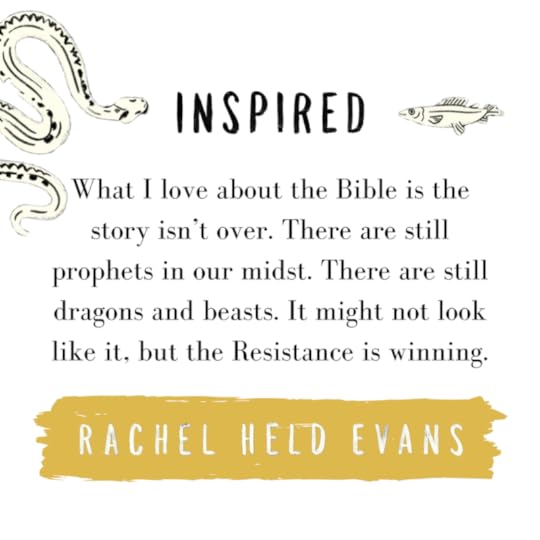
There’s just no denying that the very things for which Israel was condemned by the prophets—gross income inequality, mistreatment of immigrants and refugees, carelessness toward life, the oppression of the poor and vulnerable, and the worship of money, sex, and violence—remain potent, prevalent sins in our culture. These sins are embedded in nearly every system of our society from education to law enforcement to entertainment to religion. We are all culpable, all responsible for working for change.
Yet rather than confessing our sins, and rather than dismantling the systems that perpetuate them, many Christians shrug it off as part of an irrelevant past or spin out religious-sounding rhetoric about peace and reconciliation without engaging in the hard work of repentance and restitution. Ever the quick-fix culture, we want oppressed people to “just get over it,” to move on and let the injustice go. I’ve heard many black preachers liken the church’s response to racism in America to the words of Jeremiah, who cried, “They dress the wound of my people as though it were not serious. ‘Peace, peace,’ they say, when there is no peace” (Jeremiah 6:14).
Saying we are a nation of peace doesn’t make it so—not for Trayvon Martin, not for Tamir Rice, not for the twenty kindergartners shot at Sandy Hook Elementary School, not for that Cherokee mama, not for the Iraqi villagers in the crosshairs of our drones.
Tensions around issues of injustice must not be avoided in the name of an easy peace and cheap grace, but rather passionately engaged, until justice rolls down like a river, righteousness like a never-failing stream.
My friend Jonathan Martin, who is a third-generation Pentecostal preacher, described the election of Donald Trump as an apocalyptic event—not in the sense that it brought on the end of the world, but in the sense that it uncovered, or revealed, divides and contours in the American social landscape many of us did not want to face, deep rifts regarding race, religion, nationalism, gender, and fear. It was certainly apocalyptic for me in the way that it exposed, to my shame, my reluctance to resist certain injustices in this country until the resistance movement fit more conveniently with my political persuasions.
For too long, the white American church has chosen the promise of power over prophetic voice. We have allied ourselves with the empire and, rather than singing songs of hopeful defiance with the exiles, created more of them. We have, consciously and unconsciously, done the bidding of the Beast—not in every case, of course, but in far too many.
This is why it’s so important to follow the lead of modern-day prophets like Bree Newsome who, in scaling that flagpole, removing the Confederate flag, and declaring God’s reign over and above the tradition of prophetic protest. Her actions helped my generation visualize a better future. She simultaneously revealed things as they are and how they might be.
We must listen too to Rev. William Barber of North Carolina, who, though he struggles with a severe arthritic spinal condition and bursitis in his left knee, has marched and preached for decades on civil rights, pressing upon elected leaders and private citizens alike the moral imperative to “shock this nation with the power of love.”
I think also of my clergywomen friends, who, in the face of near-constant obstruction and all kinds of sexist double standards, preach the Word, run soup kitchens, anoint the sick, tend to the dying, sponsor refugees, get arrested at protests, and speak truth to power, day in and day out, with little thanks or praise.
I think of Jeremy Courtney of the Preemptive Love Coalition, whose work providing medical care for families in Iraq led him to advocate tirelessly on behalf of refugees and to challenge the complicity of American Christians in turning those refugees away.
And then there are the many prophets outside the United States, like the Coptic Christians of Egypt who, after terrorists bombed two churches on Palm Sunday 2017, showed up to church in unprecedented numbers seven days later to celebrate the risen Christ, their numbers literally spilling out the doors and onto the streets. Sometimes just showing up to the communion table is a way of looking straight into the eyes of the Beast and saying, “Not today.”
These are the people telling today’s resistance stories, drawing from the Bible’s deep well of prophetic examples for inspiration and strength. Though political, they avoid partisanship; though clear-eyed, they remain stubbornly hopeful…
...What I love about the Bible is that the story isn’t over. There are still prophets in our midst. There are still dragons and beasts. It might not look like it, but the Resistance is winning. The light is breaking through. So listen to the weirdos. Listen to the voices crying from the wilderness. They are pointing us to a new King and a better kingdom. As Jesus said, “Let those with ears, hear.”
Read the rest in Inspired: Slaying Giants, Walking On Water, and Loving the Bible Again.



June 14, 2018
"If Love Can Look Like Genocide, Then Love Can Look Like Anything": An Excerpt from "Inspired"
From Chapter 3: “War Stories” in Inspired: Slaying Giants, Walking On Water, and Loving the Bible Again:
“…The question of God’s character haunted every scene and every act and every drama of the Bible. It wasn’t just the story of Noah’s flood or Joshua’s conquests that unsettled me. The book of Judges recounts several horrific war stories in which women’s bodies are used as weapons, barter, or plunder, without so much as a peep of objection from the God in whose name these atrocities are committed. One woman, a concubine of a Levite man, is thrown to a mob, gang-raped, and dismembered as part of an intertribal dispute (Judges 19). Another young girl is ceremonially sacrificed to God after God grants a military victory to her father, Jephthah, who promised to offer as a burnt offering “whatever comes out of the door of my house to meet me when I return in triumph from the Ammonites” (Judges 11:31). Earlier, in the book of Numbers, God assists the Israelites in an attack against the Midianites, and tells the Israelites to kill every man, woman, and child from the community. They kill all except the young virgin girls whom the soldiers divide up as spoils of war. Feminist scholar Phyllis Trible aptly named these narratives “texts of terror.”
“If art imitates life,” she wrote, “scripture likewise reflects it in both holiness and horror.”
Rereading the texts of terror as a young woman, I kept anticipating some sort of postscript or epilogue chastising the major players for their sins, a sort of Arrested Development–style “lesson” to wrap it all up—“And that’s why you should always challenge the patriarchy!” But no such epilogue exists. While women are raped, killed, and divided as plunder, God stands by, mute as clay.
I waited for a word from God, but no word came.
It was as though I lived suspended in the tension of two apparently competing convictions: that every human being is of infinite worth and value, and that the Bible is the infallible Word of God. These beliefs pulled at me with the gravitational forces of large planets. I couldn’t get rid of them, and yet I couldn’t seem to resolve them either. The tension was compounded by a growing confluence of mis- givings I had about the absence of women in leadership in my church, the shaming of young women perceived to be immodest or “impure,” and the insistence that God is most pleased when women are submissive and quiet. My home had always been a place of refuge, where the voices of women were valued and honored, but as I graduated from high school and entered college, I began to wonder if the same was true for the broader Christian community to which I belonged.
When I turned to pastors and professors for help, they urged me to set aside my objections, to simply trust that God is good and that the Bible’s war stories happened as told, for reasons beyond my comprehension.
“God’s ways are higher than our ways,” they insisted. “Stop trying to know the mind of God.”
It’s an understandable approach. Human beings are finite and fallible, prone to self-delusion and sentimentality. If we rely exclusively on our feelings to guide us to truth, we are bound to get lost.
When asked in 2010 about Joshua’s conquest of Canaan, Reformed pastor and theologian John Piper declared, without hesitation, “It’s right for God to slaughter women and children anytime he pleases. God gives life and he takes life. Everybody who dies, dies because God wills that they die.” Piper’s dispassionate acceptance represented pure, committed faith, I was told, while mine had been infected by humanism and emotion—“a good example of why women should be kept from church leadership,” one acquaintance said.
And for a moment, I believed it. For a moment, I felt silly for responding so emotionally to a bunch of old war stories that left the rest of the faithful seemingly unfazed. But this is the deleterious snare of fundamentalism: It claims that the heart is so corrupted by sin, it simply cannot be trusted to sort right from wrong, good from evil, divine from depraved. Instinct, intuition, conscience, critical thinking—these impulses must be set aside whenever they appear to contradict the biblical text, because the good Christian never questions the “clear teachings of Scripture”; the good Christian listens to God, not her gut.
I’ve watched people get so entangled in this snare they contort into shapes unrecognizable. When you can’t trust your own God- given conscience to tell you what’s right, or your own God-given mind to tell you what’s true, you lose the capacity to engage the world in any meaningful, authentic way, and you become an easy target for authoritarian movements eager to exploit that vacuity for their gain. I tried reading Scripture with my conscience and curiosity suspended, and I felt, quite literally, disintegrated. I felt fractured and fake.
Brené Brown warned us we can’t selectively numb our emotions, and no doubt this applies to the emotions we have about our faith.
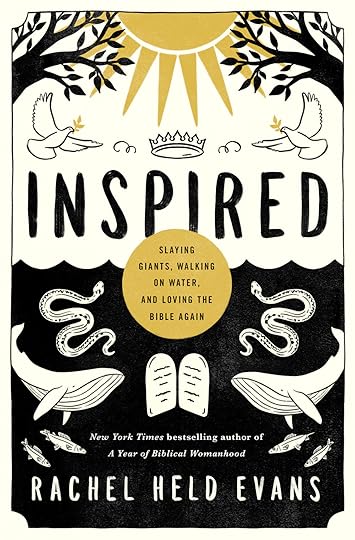
If the slaughter of Canaanite children elicits only a shrug, then why not the slaughter of Pequots? Of Syrians? Of Jews? If we train ourselves not to ask hard questions about the Bible, and to emotionally distance ourselves from any potential conflicts or doubts, then where will we find the courage to challenge interpretations that justify injustice? How will we know when we’ve got it wrong?
“Belief in a cruel god makes a cruel man,” Thomas Paine said. If the Bible teaches that God is love, and love can look like genocide and violence and rape, then love can look like . . . anything. It’s as much an invitation to moral relativism as you’ll find anywhere.
I figured if God was real, then God didn’t want the empty devotion of some shadow version of Rachel, but rather my whole, integrated self. So I decided to face the Bible’s war stories head-on, mind and heart fully engaged, willing to risk the loss of faith if that’s where the search led…
Read the rest in Inspired: Slaying Giants, Walking On Water, and Loving the Bible Again.



June 12, 2018
8 Things I Want You to Know About “Inspired”
This week marks the official release of my new book, Inspired: Slaying Giants, Walking on Water, and Loving the Bible Again. You can pick it up at a local bookstore or order online, but before you do, there are a few things you should know:
1. It’s a little weird. One chapter includes a sonnet I wrote to the beast of Revelation 13. Another features an original short screenplay that renders the story of Job into a dramatic conversation between colleagues in a college cafeteria. Between chapters 6 and 7 you get to choose your own adventure. So in addition to the personal, memoir-style reflections you’ve come to expect from me, Inspired includes some ventures into new genres—poetry, fiction, soliloquies, and vignettes—all while integrating into the narrative biblical scholarship that I hope will help you read and engage the Bible better. I wrote WAY out of my comfort zone with this one, and I think…I hope…it works.
2. I’m far more insecure about #1 than I’m letting on.
3. It’s not for everyone. If you routinely use words like “clear,” “straightforward,” or “plain,” to describe the Bible, if you remain unbothered by the Bible’s most violent stories and troubling instructions, if you use the term “biblical manhood” un-ironically, you probably won’t like it. But if you’re eager to encounter the Bible in a way that engages your skepticism, imagination, hopes, and doubts, and if you’re willing to confront the Bible’s most difficult passages head-on without relying on simplistic explanations, then I wrote this book for you.
4. For those keeping tally, this book includes one Arrested Development reference, which I believe brings the grand total for all my books to six.
5. I researched the heck out of this book. I’m not a Bible scholar, but I’m the kind of person who likes nothing more than to spend a Saturday night in my pajamas curled up with a good Bible commentary. What I wanted to do with Inspired was share some of the most interesting, paradigm-shifting, and life-changing scholarship I’ve encountered over the last few years in a way that is accessible and personal. What does it mean that Genesis 1 is better understood as an ancient Near Eastern creation narrative meant to stand in contrast to other popular Babylonian creation narratives encountered by the Jews in exile? How in the world does that information impact our day-to-day lives?
That was my challenge in writing this book, and I had an absolute ball doing it. I was also hyper-vigilant about crediting my sources, and I ran this manuscript by more people than any previous manuscript, including Old Testament and New Testament scholars. I don’t expect every reader to agree with every word—not by a long shot—but I did my homework. (If you’re interested, the most influential scholars for this project were Walter Brueggemann, Peter Enns, Delores Williams and other womanist scholars like Wil Gafney and Nyasha Junior, John Walton, Ellen Davis, Amy-Jill Levine, Phyllis Trible, N.T. Wright. Timothy Beal, James Come, Eugene Boring, and James Brownson. I also rely heavily on what I’ve learned in recent years from Jewish midrash and Ignatian spirituality.)
6. I really hope you will consider reading this one with a group. More than any other book I’ve written, Inspired is intended to be read, wrestled with, discussed, debated, and creatively engaged in the context of community, precisely because I believe the Bible invites us to do those things. Over the course of the next few weeks I’ll be sharing additional resources, including a 40-page reading guide, for those of you who choose to read Inspired for a book club, in Sunday school, as a class project, or with your small group. So keep an eye out for that.
7. This will always be my “baby book.” I started writing “Inspired” shortly after the birth of my son in 2016, and we are publishing just three weeks after the birth of my daughter in May of 2018. This is the book I wrote in between nursing sessions and on just a few hours of sleep. It’s the one that required hauling my exhausted ass to libraries and coffee shops for just a few moments of quiet to crank out 300 words here and 1,000 words there. It’s the book I was writing when the corners of my world both expanded to encompass reaches of love previously unknown and contracted to attend to the daily tasks of waking, feeding, diapering, and laundering. Every book takes a village, but this one took a veritable city of friends, family, agents, and editors, willing to give of their time and work at odd hours to ensure I could continue writing. I am so, so grateful.
8. I need your help getting the word out. With a new baby at home, I’m not able to do a book tour or many media interviews, so I’m relying heavily on my readers and on social media to generate sales. One of the most effective things you can do to help is to take a picture of your favorite quote from the book and share it with your friends. Use #InspiredBook for that. Posting reviews to Amazon and Goodreads is also appreciated.
As always, thanks for your readership and support. It never fails to humble and move me that you would want to spend time in the company of my words. May they challenge you to see the Bible, and the world it illuminates, in ways that inspire.
Get your copy of Inspired



April 23, 2018
"Inspired" Pre-Order Offer

“The story isn’t over. There are still prophets in our midst. There are still dragons and beasts. It might not look like it, but the Resistance is winning. The light is breaking through.”
– from “Resistance Stories,” in Inspired
We’re still a few weeks away from the release of my new book, Inspired: Slaying Giants, Walking on Water, and Loving the Bible Again, but today I wanted to let you know about a generous pre-order incentive offered by my publisher.
If you pre-order Inspired before June 11, and submit proof of purchase, you will receive:- The 40-page Inspired Reading Guide (PDF), written entirely by me, which includes questions for reflection and discussion, ideas for creative engagement with the relevant biblical texts, and loads of additional resources. (If you’re considering reading this book with a group, I wrote this with you in mind.)
- Two audio chapters from Inspired (MP3), including a creative reflection imagined from the perspective Hagar, an important female figure in the book of Genesis.
- Three GORGEOUS prints created by Connie Gabbert (PDF), the artist who designed the cover of Inspired. The prints feature two quotes from the book and also my “life verse,” Proverbs 27:14—“If anyone loudly blesses their neighbor early in the morning, it will be taken as a curse.”

In addition to all of this, Barnes & Noble sweetened the deal by offering an exclusive, limited run of autographed copies, available for pre-order.

All it takes is two steps:
1. Pre-order.2. Submit proof of purchase to redeem the offer.I confess I’m really eager to see how you respond to this book. It’s unlike any other I’ve written, for in addition to memoir, it includes original poetry, short stories, soliloquies, and even a short screenplay, all aimed at engaging your questions, doubts, ideas, and imagination as you wrestle with the Bible along with me.
So read with an open and curious mind.
Read with your skepticism and your imagination engaged.
Read expecting dragons.



Rachel Held Evans's Blog
- Rachel Held Evans's profile
- 1710 followers



